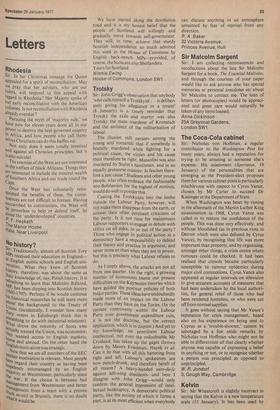184 3 history? Sir: Traditionally, almost all Scottish Tory MPs received
their education in England— at English public schools and English um ve.rsities. What they knew of Scottish hist°rY, therefore, was about the same as
their knowledge of, say, Polish history. It is
lLefreshing to learn that Malcolm Rifkind, has been dipping into Scottish history ',1.603-1707). Perhaps if he would continue
"Is historical researches he will learn more
a..bout the background to the Treaty of llion (incidentally, I wonder how many I▪ °rY voters in Edinburgh think this is svovrnething to do with industrial relations). hat drove the minority of Scots who il..ctuallY wanted the Union, was economics; e ▪ Y wanted access to English markets,
and abroad. On the other hand the glish motivation was strategic.
n N. ow that we are all members of the EEC heither motivation is relevant. Most people he regard their country as having been rr°13.elessly mismanaged by an English thai°ritY at Westminster, particularly since e war. If the choice is between bad "Ithanagement from Westminster and better tranagement from a team with a proven ‘4,4,ok. record in Brussels, there is no doubt nal it would be.
We have started along the devolution road and it is my honest belief that the people of Scotland will willingly and gradually move towards self-government.
They will, in time, achieve that sturdy Scottish independence so much admired this week in the House of Commons by English back-bench MPs—provided, of course, the Scots are also Shetlanders. Yours for Scotland Winnie Ewing House of Commons, London SW1










































 Previous page
Previous page